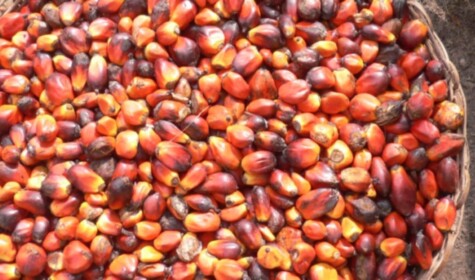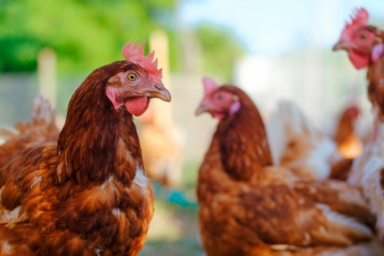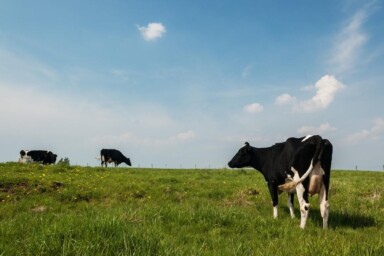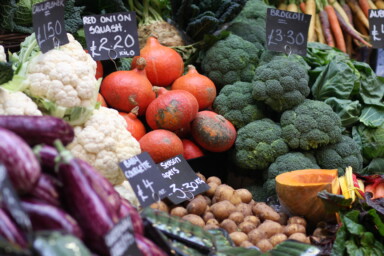Today, palm oil is in nearly everything – almost 50% of the packaged products we find in supermarkets contain the oil. This is because the oil has numerous beneficial properties that agribusiness and food producers like. It is semi-solid at room temperature. This means that it has a melting quality, which is desirable in products like chocolate, and makes it spreadable, for example, in Nutella.
It is resistant to oxidation, giving products a longer shelf-life – something that is important as globalisation increases the length of supply chains and the transit distance of foods. It’s stable at high temperatures and so helps to give fried products a crispy and crunchy texture, hence why potato crisps are often cooked in it. But most importantly, it’s odour- and colour-less, making it invisible to consumers, who may not be aware of how ubiquitous it is in processed foods.
However, our dependence on palm oil has led to significant environmental damage, particularly in Southeast Asia. While native to Africa, oil palm is now primarily grown across Southeast Asia with Indonesia and Malaysia making up over 85% of global supply, and palm oil is a major driver of deforestation in the region. The production of palm oil has resulted in huge swaths of rainforest in the region being cut down. In Southeast Asia, 45% of oil palm plantations are in areas that were forests in 1989 and in Sumatra alone at least 10.8 million hectares have been opened up for palm oil plantations. This deforestation has destroyed the habitat of many of the world’s endangered species. The first species that might jump to mind when thinking of its impact would be the orangutan. Every year it is estimated that between 1,000 to 5,000 orangutans are killed in palm oil concessions. However, the biodiversity damage goes far beyond that one magnificent primate. The Sumatran elephant, tiger and rhino are now considered critically endangered. Its production has also driven lesser known species of insects and plants that rely on the rainforest towards extinction.
There is growing public recognition of the damage caused by the production of palm oil, and the Sustainable Food Trust itself has a long history of raising concerns over the use of palm oil.
In 2010, Greenpeace released a controversial video criticising KitKat for using unsustainable palm oil in its products which sparked public outcry and prompted Nestle to address the use of it. In 2018, Iceland committed to removing palm oil from all of its own label products, releasing a pre-Christmas advertisement (voiced by Emma Thompson) that was ultimately banned from airing for being ‘too political’. However, Iceland received heavy criticism subsequently as it first attempted to just remove the Iceland name and rebrand products that contained palm oil; and, earlier this year, it was found to be selling products under its own label that contain palm oil.
So, can palm oil be sustainable? The Roundtable for Sustainable Palm Oil (RSPO) is a partnership of companies, NGOs and other entities aimed at eliminating unsustainable palm oil production. RSPO was established in 2004 and today 40% of the world’s palm oil producers are members of the RSPO. It is governed by eight principles, each with supporting indicators:
- Commitment to transparency
- Compliance with applicable laws and regulations
- Commitment to long-term economic and financial viability
- Use of appropriate best practices by growers and millers
- Environmental responsibility and conservation of natural resources and biodiversity
- Responsible consideration of employees, and of individuals and communities affected by growers and millers
- Responsible development of new plantings
- Commitment to continuous improvement in key areas of activity
However, despite these governing principles, it has not been a success. The key issue with the principles is that they are voluntary and rely on good practice to be adopted. There is little enforcement and there have been few reprisals for breaking them. A recent study found that RSPO certification has failed to prevent deforestation and biodiversity loss, particularly of orangutans. There have been repeated accusations of corruption in RSPO across the plantations that they certify, where officials have been paid to look the other way while native rainforest is destroyed.
Beyond these problems, there have been reports of exploitation and violence associated with RSPO-certified sites. Allegations of forced child labour were brought against Malaysia’s Sime Darby Plantation last year by Liberty Shared. Workers on the plantation described the imposition of arbitrary penalties, threat of and actual sexual harassment, physical threats and abuse, various and inconsistent deductions in pay, varying conditions of accommodation and fees charged for basic facilities. The NGO has petitioned the US Government to ban the import of Sime Darby palm oil into the United States. Since the company has routinely touted itself as a leader in sustainable palm oil production, it poses serious questions about the legitimacy of the RSPO certification scheme and the integrity of its assessments.
The failures thus far of RSPO create an incredibly challenging question to wrestle with, for those of us who care about sustainable food. It is clear that palm oil has a hugely damaging impact on the climate, biodiversity and local communities. It is also clear that the best outcome would be for food companies to transition away from the use of palm oil by reformulating their products to avoid its use. However, this seems unlikely to happen in the short term. Consequently, we need to find a way to produce palm oil sustainably and without environmental and societal damage. But how?
The question then focuses on the RSPO. Should we continue to support the scheme while recognising that it has thus far failed to deliver what it intended? Should we acknowledge that it is difficult to regulate and enforce production methods? Given the lack of resources, the problematic geography and the multitude of actors, there are huge challenges to delivering these goals effectively. Should we support the intention and the effort and accept that it will take time, given the many incremental steps, to make palm oil certification rigorous?
Or should we accept and recognise that the attempts of the RSPO have failed and that the organisation has allowed a corrupt, exploitative and damaging industry to continue? Should we decide that we just need to start again from scratch and design something that is fit for purpose? And if we don’t publicly acknowledge its failures, are we tacitly endorsing it? Are we perpetuating green-washing and letting the wool be pulled over people’s eyes?
It’s a tension that will require each of us to consider our own food ethics – what is important to us and why do we care? It will require deeper consideration about how we drive change within our food system – is collaboration and incremental change best? Or do we need revolutionary action to move forward? It is only through wrestling with these questions that we can decide what is best.
Photograph: oneVillage Initiative







